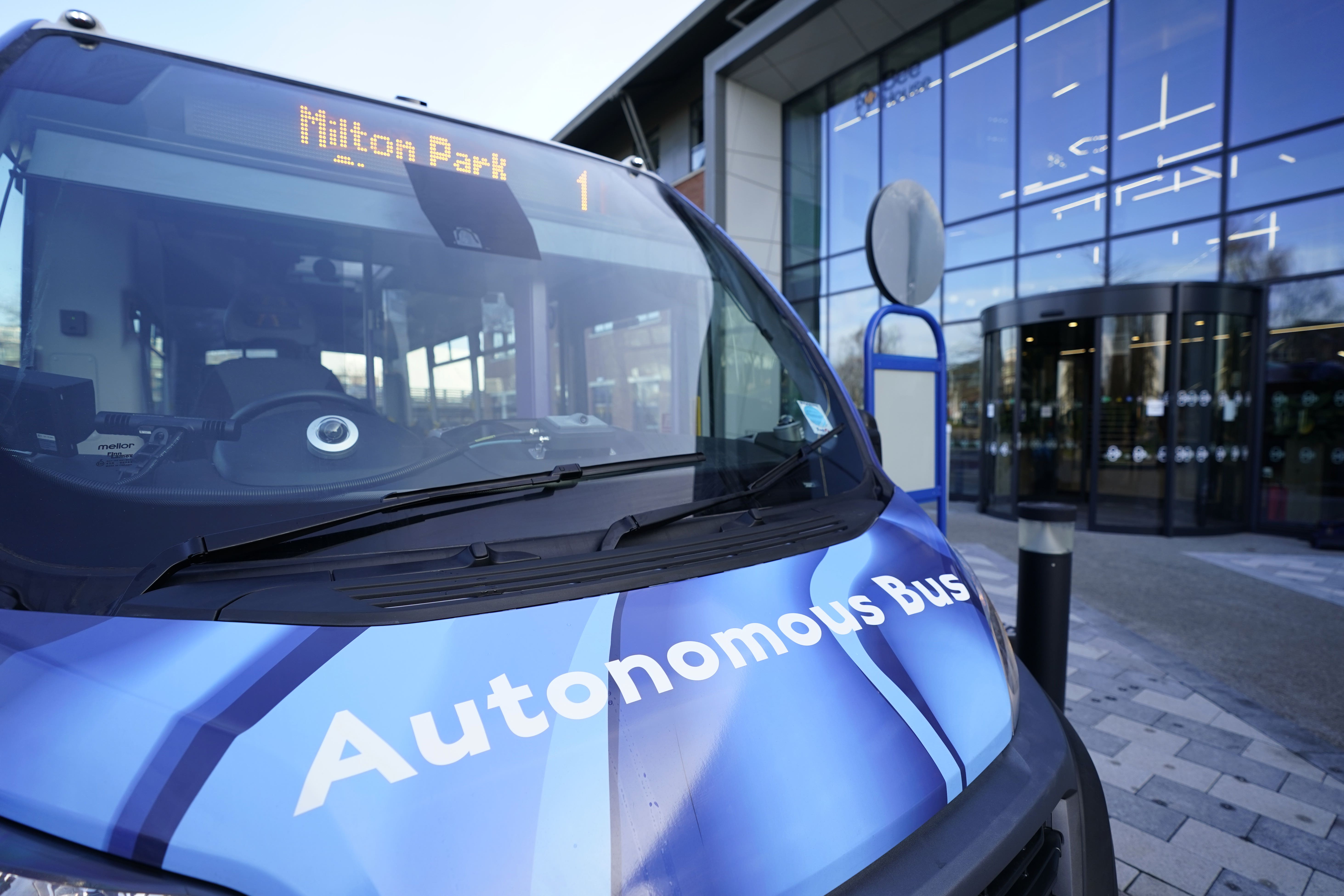UK’s first self-driving electric bus unveiled
First Group said it will analyse how people respond to autonomous buses on public roads at a business and technology park in Oxfordshire.

The UK’s first self-driving electric bus service has been unveiled as part of a project to explore “the art of the possible”.
First Group said it will analyse how passengers, drivers, other road users and pedestrians respond to autonomous buses at a business and technology park in Oxfordshire.
The project involves two all-electric fully-autonomous vehicles on public roads.
We need to explore how it works, how well accepted it is by the general public, how it works for operations, how drivers react to it, and how people who aren't using the services react to it
A minibus providing a circular service transporting people around Milton Park near Didcot was demonstrated on Monday, and will begin public operations in early February.
A full-size single-decker will be added later this year for journeys between the park and Didcot Parkway railway station, which has frequent train services to and from London and Oxford.
First Bus head of policy John Birtwistle said it is “only a matter of time” before electric buses are used across the UK, but “the autonomous side of things is more about exploring the art of the possible”.
He told the PA news agency: “The technology is spreading to different forms of transport, including potential use in buses and coaches.
“We need to explore how it works, how well accepted it is by the general public, how it works for operations, how drivers react to it, and how people who aren’t using the services react to it.”
Mr Birtwistle said “rigorous” testing has taken place to ensure the vehicles will “absolutely” be safe.
The buses are “capable of coping with all the different experiences you would have from day-to-day”, he explained.
“They can deal with traffic signals. They can deal with roundabouts. They can deal with parked vehicles.
“They can make all the turning manoeuvres as well as simple braking and acceleration.
“They can wait for gaps in traffic (before pulling out).”
Despite the vehicles being fitted with autonomous technology including cameras and sensors, a trained driver will be behind the wheel to provide assistance to passengers and take control if needed.
The experience of drivers and passengers will be a key part of the project’s assessment.
Mr Birtwistle said: “We want to try and understand is this (technology) something that makes the (driver’s) job easier – or does it actually make the job harder, because they’re concentrating on different things, there’s a different focus of their attention?
“We don’t know how individual types of passengers might react to it.
“It could be something that’s more accepted by the young, with older passengers perhaps being less keen to travel on such a vehicle.
“There’s quite an extensive programme of research which is going to address all these issues, and give us some learning and insight for potential future deployments.”
The service is being developed alongside partners including Oxfordshire County Council, transport information company Zipabout, Milton Park, automated vehicle systems provider Fusion Processing and the University of West England.
It’s thrilling to see our £3 million investment help British firms and engineers pioneer new, exciting ideas to achieve our vision of a truly efficient and sustainable transport network
The £4.3 million project has been funded by a £3 million grant from Government agency Innovate UK.
Roads minister Richard Holden said: “Hopefully it’s going to be the start of something quite radical here in the UK.
“It’s thrilling to see our £3 million investment help British firms and engineers pioneer new, exciting ideas to achieve our vision of a truly efficient and sustainable transport network.
“The launch of the UK’s first autonomous, zero-emission bus today is yet another key step towards achieving net zero, creating high-wage, high-skilled new jobs and opportunities while truly levelling up transport across the country.”
Last week another bus operator, Stagecoach, carried passengers on a full-size self-driving bus for the first time in the UK.
Twenty-two volunteers were taken on a journey by the diesel-powered single-decker over the Forth Road Bridge near Edinburgh as part of testing.
Public services are expected to begin in the spring.
In August last year the Department for Transport said it expected self-driving cars to be available for public use by 2025.
Bookmark popover
Removed from bookmarks